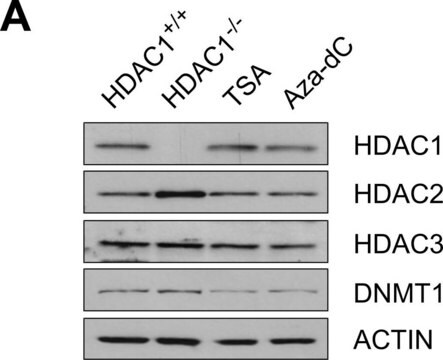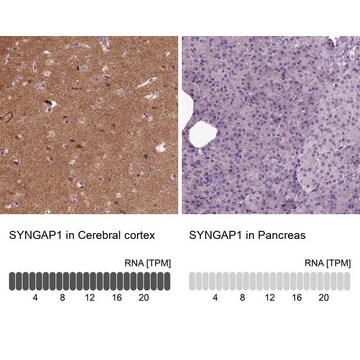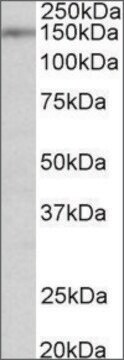06-900
Anti-SynGAP Antibody
Upstate®, from rabbit
Zaloguj sięWyświetlanie cen organizacyjnych i kontraktowych
About This Item
Kod UNSPSC:
12352203
eCl@ss:
32160702
NACRES:
NA.41
Polecane produkty
pochodzenie biologiczne
rabbit
Poziom jakości
forma przeciwciała
purified antibody
rodzaj przeciwciała
primary antibodies
klon
polyclonal
reaktywność gatunkowa
rat
producent / nazwa handlowa
Upstate®
metody
immunocytochemistry: suitable
western blot: suitable
numer dostępu NCBI
numer dostępu UniProt
Warunki transportu
dry ice
docelowa modyfikacja potranslacyjna
unmodified
informacje o genach
human ... SYNGAP1(8831)
Opis ogólny
Silent synapses, or excitatory synapses that lack functional -amino-3-hydroxy-5-methyl-4-isoxazolepropionic acid receptors (AMPARs), are thought to be critical for regulation of neuronal circuits and synaptic plasticity. SynGAP, an excitatory synapse-specific RasGAP, regulates AMPAR trafficking, silent synapse number, and excitatory synaptic transmission in hippocampal and cortical cultured neurons. Over expression of SynGAP in neurons results in a remarkable depression of AMPAR-mediated miniature excitatory postsynaptic currents, a significant reduction in synaptic AMPAR surface expression, and a decrease in the insertion of AMPARs into the plasma membrane. Synaptic transmission is increased in neurons from SynGAP knockout mice as well as in neuronal cultures treated with SynGAP small interfering RNA.
Specyficzność
SynGAP
Immunogen
peptide (KRLLDAQRGSFPPWVQQTRV) corresponding to amino acids 1289-1308 of rat SynGAP-a
Zastosowanie
Anti-SynGAP Antibody detects level of SynGAP & has been published & validated for use in IC & WB.
Immunocytochemistry: 0.1 µg/mL has been reported to immunostain SynGAP in neuron cultures fixed with 4% paraformaldehyde, 4% sucrose and perme-abilized with 0.1% Triton X-100 (2).
Research Category
Neuroscience
Neuroscience
Research Sub Category
Synapse & Synaptic Biology
Synapse & Synaptic Biology
Powiązanie
Replaces: 04-1071
Postać fizyczna
Format: Purified
Protein A purified
Purified in PBS with 0.05% NaN3 and 30% Glycerol
Przechowywanie i stabilność
Maintain at -20°C in undiluted aliquots for up to 1 year after date of receipt.
Informacje prawne
UPSTATE is a registered trademark of Merck KGaA, Darmstadt, Germany
Oświadczenie o zrzeczeniu się odpowiedzialności
Unless otherwise stated in our catalog or other company documentation accompanying the product(s), our products are intended for research use only and are not to be used for any other purpose, which includes but is not limited to, unauthorized commercial uses, in vitro diagnostic uses, ex vivo or in vivo therapeutic uses or any type of consumption or application to humans or animals.
Ta strona może zawierać tekst przetłumaczony maszynowo.
Nie możesz znaleźć właściwego produktu?
Wypróbuj nasz Narzędzie selektora produktów.
Kod klasy składowania
10 - Combustible liquids
Klasa zagrożenia wodnego (WGK)
WGK 2
Certyfikaty analizy (CoA)
Poszukaj Certyfikaty analizy (CoA), wpisując numer partii/serii produktów. Numery serii i partii można znaleźć na etykiecie produktu po słowach „seria” lub „partia”.
Masz już ten produkt?
Dokumenty związane z niedawno zakupionymi produktami zostały zamieszczone w Bibliotece dokumentów.
Characterization of a novel synGAP isoform, synGAP-beta.
Li, W; Okano, A; Tian, QB; Nakayama, K; Furihata, T; Nawa, H; Suzuki, T
The Journal of Biological Chemistry null
Ayse Dosemeci et al.
FEBS letters, 590(17), 2934-2939 (2016-08-02)
Ankyrin repeat and sterile alpha motif domain-containing protein 1B (ANKS1B, also known as AIDA-1) is a major component of the postsynaptic density (PSD) in excitatory neurons where it concentrates at the electron-dense core under basal conditions and moves out during
SynGAP isoforms exert opposing effects on synaptic strength.
McMahon, AC; Barnett, MW; O'Leary, TS; Stoney, PN; Collins, MO; Papadia, S; Choudhary et al.
Nature Communications null
MET receptor tyrosine kinase controls dendritic complexity, spine morphogenesis, and glutamatergic synapse maturation in the hippocampus.
Qiu, S; Lu, Z; Levitt, P
The Journal of Neuroscience null
Yuko Tanabe et al.
Nature communications, 8(1), 408-408 (2017-09-03)
Coordinated development of excitatory and inhibitory synapses is essential for higher brain function, and impairment in this development is associated with neuropsychiatric disorders. In contrast to the large body of accumulated evidence regarding excitatory synapse development, little is known about
Nasz zespół naukowców ma doświadczenie we wszystkich obszarach badań, w tym w naukach przyrodniczych, materiałoznawstwie, syntezie chemicznej, chromatografii, analityce i wielu innych dziedzinach.
Skontaktuj się z zespołem ds. pomocy technicznej








